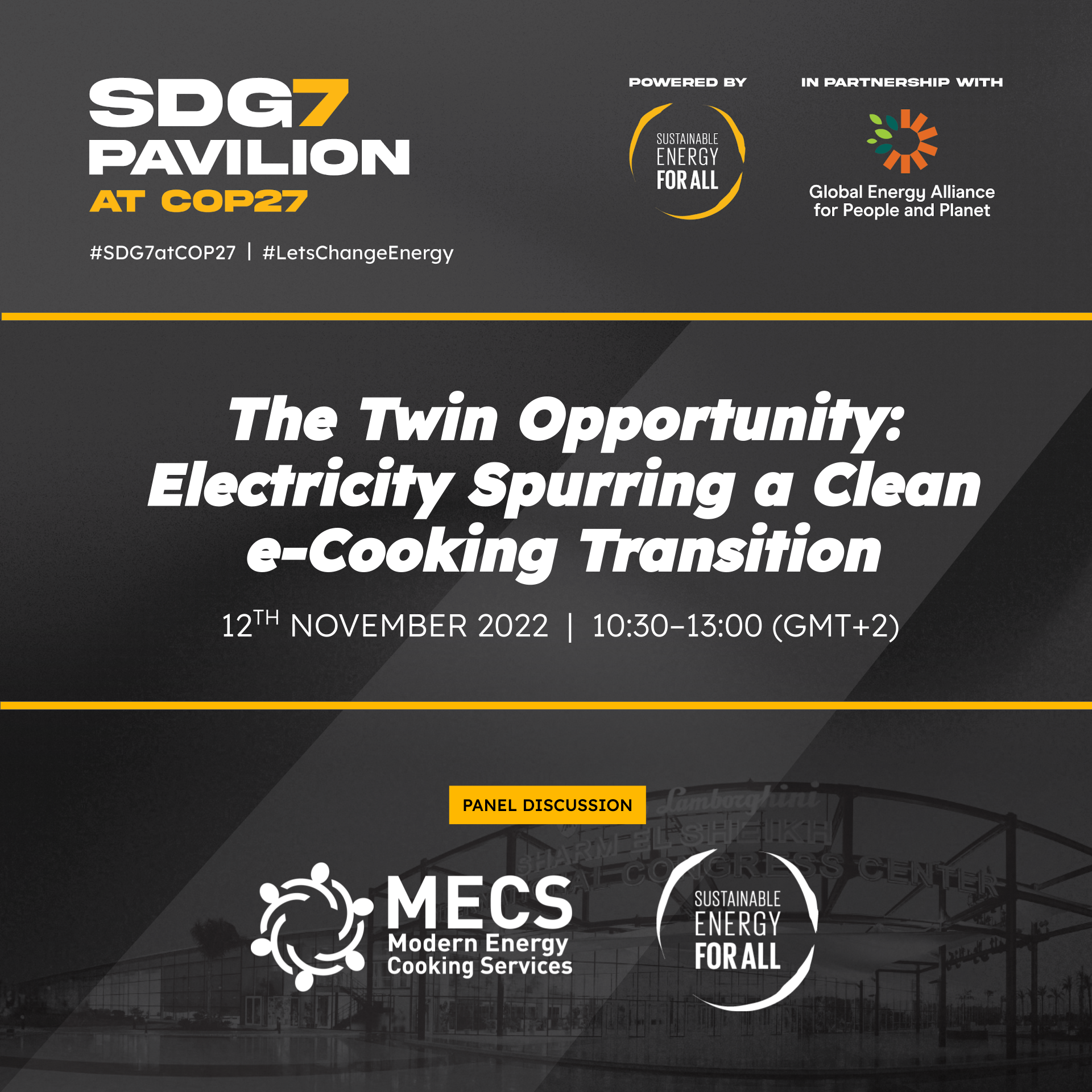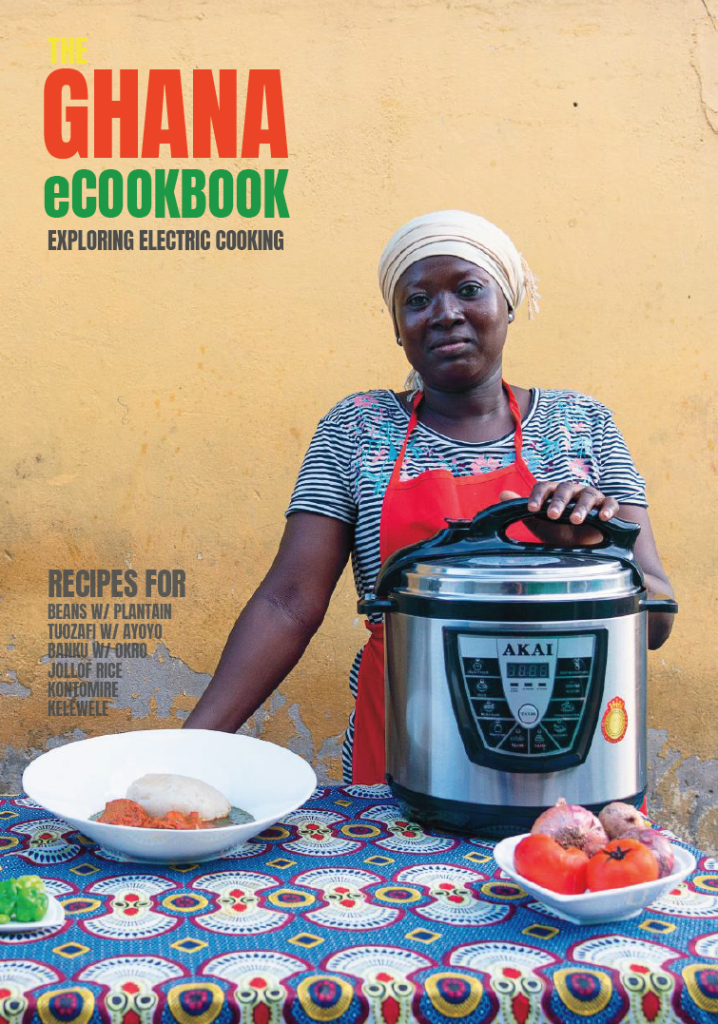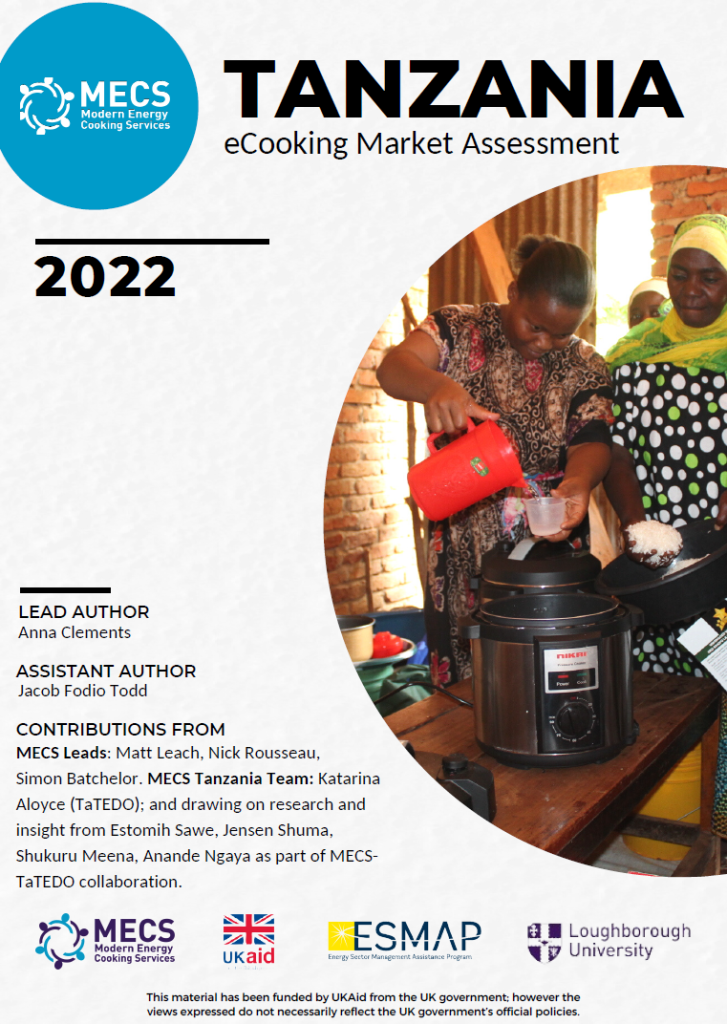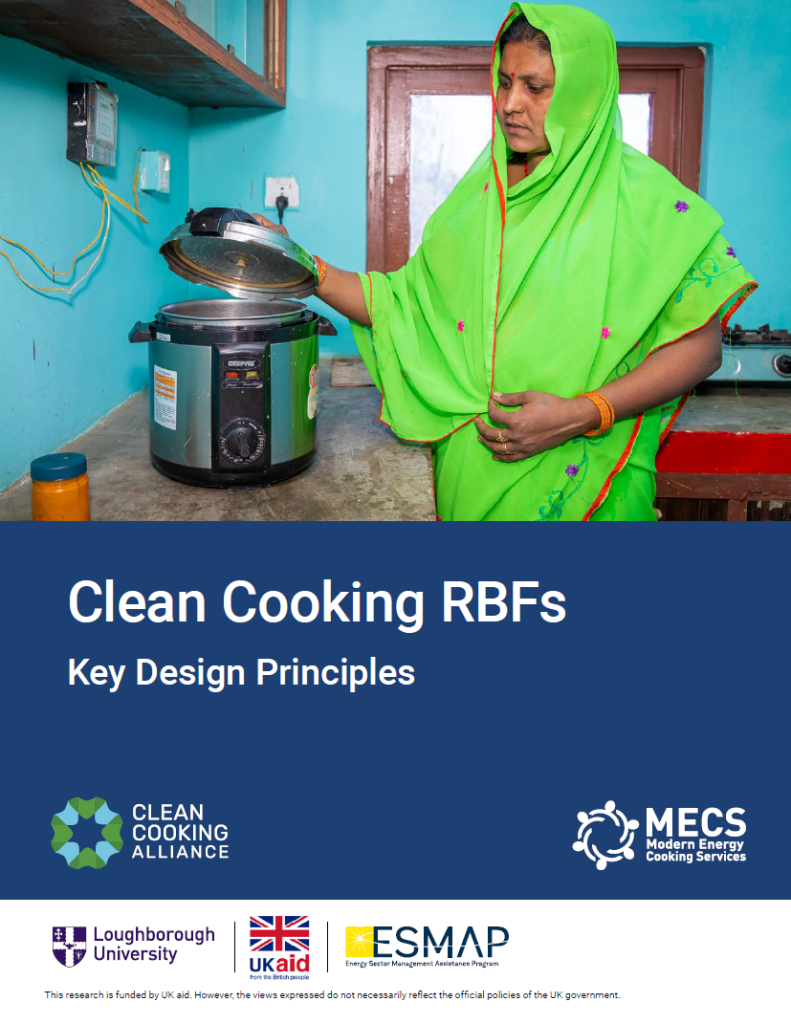
- Date
- 11th November 2022
- Categories
By Dr. Joni Cook (Loughborough University, UK).
The Modern Energy Cooking Services (MECS) programme, funded by UK aid (FCDO), has a strong presence at COP27 to champion the importance of clean cooking, particularly cooking with electricity (eCooking), as a critical climate solution, and to urge countries to take up the twin opportunity of incorporating clean cooking into integrated energy planning to realise multiple wins for climate, environment, health, and gender.
As global leaders gather this week for the 27th Conference of the Parties (COP27) in Sharm el-Sheikh, recently released United Nations reports show that ‘time is running out’ for averting the worst impacts of the climate crisis. Despite increased public awareness of the climate emergency, action by the international community has not galvanised – global net anthropogenic emissions have continued to increase across all major groups of greenhouse gases (GHGs) (Fig. 2). The IPCC Working Group III report emphasises that in order to limit anthropogenic warming to around 1.5 degrees Celsius above pre-industrial levels and secure a liveable future, global GHGs must peak by 2025 at the latest and then be reduced by 43% by 2030. Therefore, strong and immediate concrete actions in reducing GHGs by all governments across all sectors are required.

Clean cooking, particularly cooking with electricity (eCooking), is a proven and critical climate solution for emissions reductions, and is a key component of achieving Sustainable Development Goal (SDG) 7 – access to affordable, reliable, sustainable and modern energy for all by 2030, however it continues to be an enduring problem worldwide. 4 billion people lack access to modern energy cooking services, continuing to cook using polluting biomass fuels which are responsible for up to 4 million premature deaths per year due to exposure to household air pollution (HAP) generated by cooking, lighting and heating, approximately 2% of global GHGs (the same contribution to global GHGs as the aviation and shipping industries) and over 50% of the short-lived pollutant black carbon. In addition to its proven role as a critical climate solution, clean cooking delivers multiple health, environmental and social co-benefits. Accelerating access to clean cooking boosts the climate resilience of these communities, which are the most vulnerable worldwide – ‘those that have contributed least to the climate crisis are being hit first & hit hardest’ (Antonio Guterres, Secretary-General of the UN, 8 November 2022) – through improving the environment, such as through reduced forest loss and degradation, and improving health, gender equality and livelihoods, particularly for women and children.
The MECS programme has been researching the socio-economic realities of a transition from polluting fuels to a range of modern fuels. Whilst the research covers several clean fuels, the evidence is pointing to the viability, cost effectiveness, and user satisfaction that energy efficient electric cooking devices provide. The MECS evidence base clearly and consistently shows that electricity is the most cost-effective fuel for cooking, compared with other modern and biomass fuels across a wide range of contexts, and that cooking using energy-efficient electric devices such as the electric pressure cooker is compatible with a wide variety of cuisines. For example, preliminary findings of the recently launched Ghana eCookbook (Fig. 3), the latest publication in the MECS eCookbook series, shows that it can be 2-4 times cheaper to cook using electricity than LPG or charcoal. While significant progress has been made in enhancing access to electricity over the last decade, these gains have largely been disconnected from the enduring problem of clean cooking. Now they have to be used to make significant gains in expanding access to clean cooking, especially in regions and countries with the fastest electrification rates and the cleanest grids.

MECS eCooking Market Assessments highlight the tremendous potential for scaling eCooking in a diverse range of sub-Saharan African and ASEAN country contexts. In Tanzania, for example, considerable progress in electrification has been made with coverage more than doubling between 2010 and 2020 from 14% to 40%, which along with a strong policy enabling environment and research showing the compatibility of energy-efficient electric cooking devices with Tanzanian cuisine indicates great potential for expanding access to eCooking. Utilities are increasingly starting to realise the potential that the rapid expansion of eCooking has in helping to stimulate consumer demand in cases where the country has excess generation capacity. In Kenya, where 75% of the population have access to electricity yet 0% of Kenyans use electricity for cooking, 70% of the country’s GHGs are produced by the cooking sector. The African Center for Technology Studies (ACTS) in collaboration with its partners from the Clean Cooking Association Kenya (CCAK), the Kenya Power & Lighting Company (KPLC), Gamos East Africa, and SCODE have recently launched eCooking Hubs in four counties to accelerate progress towards the policy aim of 100% access to clean cooking for all Kenyans by 2028 in alignment with the National Clean Cooking Strategy and eCooking Strategy. We urge country leaders to take up the twin opportunities that incorporating eCooking with integrated energy planning offers, in order to deliver multiple co-benefits for climate, health, environment, gender and livelihoods.

Whilst public and private funding for clean cooking remains catastrophically underfunded – an annual investment of 4.5 billion USD is needed to achieve universal access to clean cooking by 2030 (we believe that this could be a significant under-estimate) yet only a fraction of this is invested (131 million in 2018) – a recent joint report by the World Bank, IEA, IRENA, UN and WHO shows that the economic costs of inaction on clean cooking are far greater, carrying a cost of 2 trillion USD per year. MECS activities, in collaboration with a diverse range of leading public and private actors across finance, clean cooking, renewable energy and sustainable development sectors, have resulted in the launch of a range of tools, methodologies and other outputs which offer clear recommendations and tangible financial pathways for removing the barriers to rapidly scale eCooking, as well as directly supporting and promoting small- and medium-sized businesses in the clean cooking sector to foster their ideas and build their capabilities.
A recent collaboration between MECS and Energy 4 Impact resulted in the launch of the Financing Clean Cooking series, a series of five reports which comprise a detailed analysis of the financing mechanisms currently being used within the sector, whilst offering recommendations to donors on the critical financial interventions needed to support the transition to clean and modern energy cooking. Further support for donors and practitioners is provided in the recently launched report ‘Clean Cooking RBFs: Key Design Principles‘ by the Clean Cooking Alliance and MECS, which presents 12 clean cooking Results-Based Financing (RBF) case studies to help RBF practitioners to gain a more detailed understanding of the landscape of RBFs in the clean cooking sector. We hope that these tools and resources catalyse sector stakeholders, particularly governments, private sector such as electric appliance manufacturers and utilities, to step up action to benefit from the twin opportunities that incorporating eCooking in integrated energy planning offers, in order to rapidly scale transitions to modern energy cooking services for the benefit of people and planet.

At MECS, a key theme running through all areas of our programme of activity is the importance of forging and strengthening collaborative partnerships, particularly those multidisciplinary and intersectoral in nature, to catalyse tangible progress towards just and inclusive transitions to modern energy cooking services for all. We continue to strengthen partnerships with a diverse range of private and public stakeholders across the clean cooking, renewable energy, finance and sustainable development sectors, working closely with country partners and communities on the ground focusing in particular but not exclusively in 15 countries of interest. In the latest exciting development on this theme, we will be announcing a new collaborative programme of activity between MECS and SEforALL at the MECS-SEforALL joint session at COP27 on the 12th November 2022. The programme of activity is designed to strengthen the integration of eCooking within an integrated approach to energy planning, and we welcome other organisations to contact us to discuss how they can join in the collaboration. In summary, the urgency for stepping up action to realise transitions to modern energy cooking services worldwide is paramount, and we hope that the continued efforts of MECS and our many global partners participating in COP27 in showcasing the rigorous evidence base of clean cooking as a critical climate solution will lead to concrete action in stepping up financial investment and political action for clean cooking to contribute towards closing the emissions gap and achieving sustainable, affordable and modern low-carbon energy transitions without leaving anyone behind.
……………………………………………
Featured image, Figure 1, top: Co-organised by MECS and SEforALL, the session ‘The Twin Opportunity: Electricity Spurring a Clean e-Cooking Transition’ to be held in the SDG7 Pavilion at COP27 on 12 November 2022, will bring together utilities, high-level government representatives, development banks and philanthropies to discuss how a pivot to e-Cooking (cooking with electricity) can leverage the investments made in infrastructure improvements to rapidly expand levels of cooking with electricity.